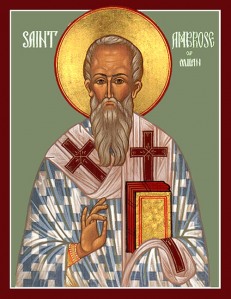 Just as Jonah was plunged into a deep sleep within the ship, without a thought of being woken up, so did our Lord Jesus Christ, who in the mystery of his death provided the antitype of that Old Testament figure, sleep soundly during his lifetime, as the gospel tells us, in a boat.
Just as Jonah was plunged into a deep sleep within the ship, without a thought of being woken up, so did our Lord Jesus Christ, who in the mystery of his death provided the antitype of that Old Testament figure, sleep soundly during his lifetime, as the gospel tells us, in a boat.
And just as Jonah passed three days and nights in the belly of a whale, so did the Son of Man spend three days in the heart of the earth after his death. But after he had raised himself from the dead and roused his body from its sleep for the salvation of all, he visited his disciples.
Christ, then, is the true Jonah, who gave his life for our redemption. For this reason he was taken up on deck and cast overboard into the sea in order to be swallowed up by the whale.
Job had this to say about the whale: He holds in captivity a huge sea monster. And what kind of beast is this meant to be? You will know when you read that our Lord Jesus Christ took captivity captive. Once our adversary and bitter enemy had been subdued, we, who had been under his dominion, began to enjoy our liberty, thanks to Christ.
The prayer itself of holy Jonah throws some light upon the mystery of the Lord’s passion, for he said, I have cried out to the Lord in my affliction, and my voice has reached him from the depths of Sheol – not, you will notice, from the depths of the whale’s belly. For it was into Hades that the Lord went down, not in any whale, so that he might loose those who were detained there from their everlasting bonds.
Now, who was it that offered to the Lord God his sacrifice with praise and thanksgiving if not our great High Priest himself, who made his vows and paid them on behalf of all of us? For he alone could make his sacrifice effective.
Just as Jonah, by being cast into the sea, was able to allay its fury, so did our Lord Jesus Christ, by coming into the world, win it for himself, and through his blood he established it everywhere – in heaven and on earth.
By his coming he redeemed all men and women, and by his deeds he brought them all to love and worship God; he raised the dead and healed the sick, implanting in people’s souls a reverence for God. He it was who offered to the Father a sacrifice of atonement on our behalf, presenting God with an oblation capable of justifying us. He it was who slept and woke again.
Ambrose of Milan (c. 337-397): On Psalm 43, 83-85 (PL 14:1183-1184, 1129-1139); from the Monastic Office of Vigils, Monday of the Nineteenth Week in Ordinary Time, Year 2.








